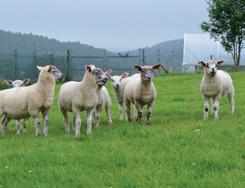
3 minute read
Hutton Institute
arable & root crops Independent trials recognise best performing and most consistent bio-stimulants
Independent trials conducted in drought prone soils, comparing the performance of commonly used bio-stimulants on Skyfall winter wheat with a 50% fungicide programme, have found AminoA FLO to be one of the best performing and most consistent bio-stimulants in the study.
Advertisement
The NIAB trials conducted at Cirencester saw AminoA FLO, a UK manufactured, highly concentrated natural biostimulant and nutrient source, produce a statistically signifcant yield increase above the reduced fungicide programme, and also a signifcant increase in green leaf retention.
“Statistical analysis of data showed that the treatments had a substantial effect on the grain yield,” explains Richard Phillips, managing director of AminoA.
The full fungicide programme produced a higher yield (9.18 t/ha) than the reduced rate of fungicide treated plots (8.69 t/ha). The untreated yield was 7.54 t/ha.
“The use of AminoA FLO with the reduced rate of fungicide at T0 and T1 had a positive effect on the grain yield and produced 9.17 t/ha. Reduced fungicide with AminoA FLO at T1 and T2 produced 9.00 t/ ha,” explains Mr Phillips.
The AminoA Flo T1 and T2 programme resulted in pointedly higher green fag leaf retention (78.30%), compared to the untreated at 28.30. The full fungicide inputs (36.7%), was much lower than the 63.30% AminoA FLO T0 and T1 treatment.
“This shows the importance of early applications to establish yield potential, and the importance of including AminoA at all fungicide timings,” adds Mr Phillips.
The fndings back up NIAB’s previous claims that AminoA FLO can reduce reliance on fungicide inputs. The Cirencester trial site was in drought prone, shallow soils, with little moisture, and the results provide strong evidence that AminoA bio-stimulants can reduce fungicide use by around 30-40%.
Pioneering natural capital approach to land use management in the Scottish uplands

A pioneering analysis by James Hutton Institute social scientists explores the potential and value of applying a ‘natural capital’ approach to the land-based business of the Institute’s Glensaugh farm, where the aim is to demonstrate climate-positive farming.
The report shines a light on how the recently published Natural Capital Protocol (NCP) may help land managers when considering agricultural land use decisions, and contributes to ongoing initiatives to test natural capital approaches in land-based business in Scotland.
Natural capital means the stock of renewable and non-renewable resources, including plants, animals, air, water and soil, that combine to provide benefits to people, and the NCP is a framework that enables organisations to identify, measure and value their impacts on natural capital, and in that way provide better ways to measure results from nature for decision-making.
The study assesses the impacts of past, current and future farm management strategies through a natural capital lens in the context of a Scottish upland farm. If offers insight into management decisions from 2002 to 2018 and the trade-offs arising from

further woodland expansion, as one of the actions to help work towards net-zero emissions farming.
Author of the report Dr Paola Ovando Pol said: “The NCP acts as a framework for a systematic analysis of dependencies, impacts, risk and opportunities involving natural capital. The Glensaugh application shows that natural capital assessment can be useful to inform decisionmaking pertaining to land use and management strategies.”
The work is being funded by the Macaulay Development Trust.
Glensaugh is an upland livestock farm of just over 1000 ha, with sheep, cattle, red deer, improved and extensive pastures, moorland, and woodland. At 7%, its current woodland cover is close to the average across all farms in Scotland but is actively being expanded for carbon storage, biodiversity, and other benefits, reflecting UK and Scottish government ambitions.
For more information about the climate-positive farming initiative at Glensaugh, visit its brand-new website.
The James Hutton Institute is a world-leading scientific research organisation working to resolve global challenges in food, climate, energy and water security. The Institute works in partnership with people, organisations and governments to enhance sustainable environmental, social and economic development to deliver practical solutions for our shared future. www.hutton.ac.uk










